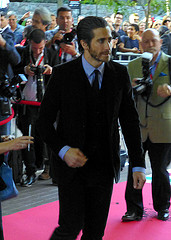Share This Article:
Return to Silver Screen Central Home page


Jake Gyllenhaal plays another quirky character in Demolition
CTearing one’s clothes is a sign of mourning in some cultures. However, Davis Mitchell, Jake Gyllenhaal’s character in the new movie Demolition, goes well beyond this as he systematically dismantles his entire house after his wife dies in an auto accident. Eventually, the house falls apart, and so too does the movie.
Davis at first feels nothing after his wife’s death, but after his father-in-law Phil (Chris Cooper) makes a comment about taking things apart before putting them together again, Davis quits going to work and compulsively disassembles or destroys everything he can. Soon, his only human contact is Karen (Naomi Watts), an equally troubled woman who takes Davis in.
Demolition was directed by Jean-Marc Vallée, whose two previous films, Wild and Dallas Buyers Club also featured people who deal with tragedy in their lives in bizarre ways. The difference is that the other two films were based on real people, while Davis Mitchell is merely a symbol. As played by Gyllenhaal, Davis is relatable, a man who eventually realizes he never really felt much about anything before. But instead of giving Davis’ actions some degree of credibility in Demolition, the script by Bryan Sipe merely comes up with increasingly outlandish acts of destruction, culminating in a scene in which Davis persuades Karen’s teenage son (an excellent Judah Lewis) to shoot him while Davis wears a bulletproof vest. Since, in real life, Davis would have been institutionalized halfway through the film, Vallée and Sipe clearly intend Demolition as a metaphorical film. But it’s not funny enough to succeed as dark comedy and not uplifting enough to succeed as magical whimsy, despite a final feel-good scene. The best scenes in Demolition are those between Gyllenhaal and Lewis, which suggest that a more realistic film about Davis’ new “family” might have succeeded. However, that storyline ends abruptly and rather arbitrarily, as if Vallée had decided that the movie had gone on long enough. Gyllenhaal’s performance and chemistry with Lewis make Demolition watchable, but the audience will wish that someone had repaired the damage to the script before filming.
Continue reading on Demolition: Mini-review


Recent Comments